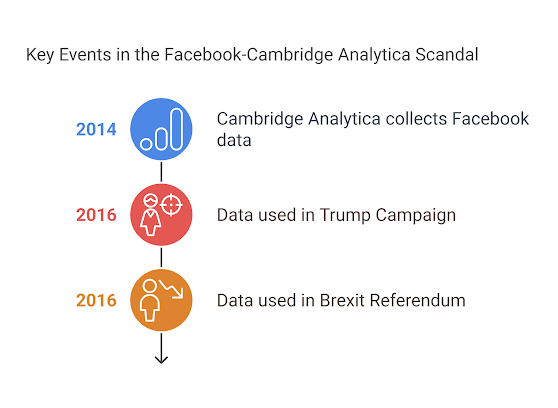The Great Data Heist: How Facebook and Cambridge Analytica Shaped Elections
Introduction
In 2018, one of the biggest data privacy scandals in history was exposed—the Facebook-Cambridge Analytica data breach. This data heist revealed how personal information from 87 million Facebook users was illegally harvested and used to influence major political events, including the 2016 U.S. Presidential Election and the UK Brexit Referendum.
The scandal raised serious concerns about the power of big data, social media influence, and the vulnerability of democracy to digital manipulation. It exposed loopholes in data protection laws, forcing governments worldwide to rethink digital privacy regulations.
Key Questions This Article Explores:
- How did Cambridge Analytica collect and misuse data?
- What role did Facebook play in the scandal?
- How did big data analytics influence elections?
- What were the legal and ethical consequences?
- What lessons can individuals and businesses learn?
The Facebook-Cambridge Analytica Scandal: What Happened?
How Did Cambridge Analytica Collect Facebook Data?
In 2014, a British data analytics firm, Cambridge Analytica, secretly harvested personal data from millions of Facebook users without their consent. The data collection was enabled by:
🔹 A Facebook quiz app ("This Is Your Digital Life") created by researcher Aleksandr Kogan.
🔹 The app collected detailed personality traits, interests, and social connections of users.
🔹 Only 270,000 people took the quiz, but due to Facebook’s lax data-sharing policies, the app could access data from friends of those users, leading to massive data harvesting.
How Was the Data Used?
Cambridge Analytica processed and analyzed the stolen data to:
✅ Create psychographic profiles of millions of voters.
✅ Identify persuadable individuals in swing states.
✅ Target users with highly personalized political ads to influence their voting behavior.
This strategy helped shape key political events, including:
- The 2016 Trump Campaign → Used targeted Facebook ads based on voter personalities.
- Brexit Referendum (2016) → Influenced public sentiment toward leaving the EU.
The Role of Big Data in Political Manipulation
How Can Big Data Influence Elections?
Big data allows political campaigns to:
📌 Segment voters based on demographics, behavior, and psychology.
📌 Deliver customized political messages to influence decisions.
📌 Spread misinformation and emotional triggers to sway public opinion.
Cambridge Analytica’s Psychological Targeting
Cambridge Analytica used psychographic profiling to classify voters into:
- "Openness" voters (More liberal, targeted with progressive messaging).
- "Conscientiousness" voters (More conservative, targeted with nationalist messaging).
- "Agreeableness" voters (Undecided, bombarded with fear-based political ads).
By leveraging big data and AI-powered microtargeting, political campaigns manipulated voter behavior at an unprecedented scale.
Legal and Ethical Implications of Data Misuse
Why Was This Data Collection Illegal?
The Cambridge Analytica data scandal violated:
🚨 Facebook’s data-sharing policies (Data collected under false pretense).
🚨 Global data protection laws (No user consent).
🚨 Ethical principles (Manipulation of democracy using private data).
Ethical Concerns Raised by the Scandal
🔴 Breach of user trust → Facebook users were unaware their data was stolen.
🔴 Threat to democracy → Elections were influenced by psychological manipulation.
🔴 No accountability → Facebook initially denied wrongdoing.
The scandal triggered public outrage, leading to legal battles and regulatory scrutiny.
How Cambridge Analytica Influenced Elections Globally
Major Elections Impacted by Cambridge Analytica:
📌 2016 U.S. Presidential Election → Boosted Trump’s campaign with targeted misinformation.
📌 2016 Brexit Referendum → Fueled pro-Brexit sentiment using fear-based messaging.
📌 Elections in India, Kenya, and Nigeria → Used similar data tactics in political campaigns.
How Did Targeted Ads Work?
✅ Swing voters were bombarded with emotionally charged political ads.
✅ Misinformation campaigns spread conspiracy theories to manipulate opinions.
✅ AI-driven content optimized ads to provoke maximum emotional response.
Facebook’s Role: Negligence or Complicity?
Did Facebook Know About the Data Breach?
✔ Facebook allowed third-party apps to access user data.
✔ Ignored security risks despite internal concerns.
✔ Failed to notify affected users for years.
🔴 Facebook was fully aware but delayed action to protect its advertising revenue.
Legal Consequences and Regulatory Response
Fines and Legal Penalties
📌 Facebook fined $5 billion by the U.S. Federal Trade Commission (FTC).
📌 Cambridge Analytica shut down due to lawsuits and bankruptcy.
📌 CEO Mark Zuckerberg testified before U.S. Congress.
Impact on Digital Privacy Laws
New Laws Introduced After the Scandal
✅ GDPR (EU General Data Protection Regulation) → Strengthened user consent policies.
✅ CCPA (California Consumer Privacy Act) → Gave users more control over personal data.
✅ DPDPA 2023 (India’s Digital Personal Data Protection Act) → Introduced strict compliance rules.
The scandal transformed global privacy regulations, forcing social media giants to improve transparency.
Lessons Learned from the Scandal
✔ User data must be protected, not exploited.
✔ Stronger data privacy laws are necessary.
✔ Big tech must be held accountable for data misuse.
Governments, companies, and individuals must take privacy more seriously to prevent similar breaches.
Best Practices for Protecting Personal Data
🔒 Avoid sharing sensitive data with third-party apps.
🔒 Regularly review Facebook and social media privacy settings.
🔒 Use VPNs and privacy-focused browsers to reduce data tracking.
🔒 Stay informed about digital privacy laws and rights.
Conclusion: The Future of Data Privacy in Elections
The Facebook-Cambridge Analytica scandal exposed the dark side of big data and social media influence in politics. Moving forward:
🚀 Stronger data protection laws will prevent future breaches.
🚀 Big tech companies must improve transparency.
🚀 Users must take control of their digital footprint.
The future of digital democracy depends on ethical data practices and accountability.
Frequently Asked Questions (FAQs)
❓ What was the Cambridge Analytica scandal?
✔ A data breach where 87 million Facebook users’ data was misused for political targeting.
❓ Did Facebook face legal action?
✔ Yes, Facebook was fined $5 billion by the FTC.
❓ How did Cambridge Analytica influence elections?
✔ By using psychographic profiling to micro target voters with manipulative ads.



.png)
.png)
.png)



0 Comments